Souce:admin Views: Posttime:2016-07-07 17:05:55
I. The Aim of Cultivation
The objective of this specialty program is to produce a new, creative type of talented person in archaeology who has physical and psychological well-being and with full development of morality, wisdom, physique and aesthetics, who has a good moral character and professional quality, and is a law-biding citizen. Qualified graduates of this program are expected to be equipped with frontier historical theory, systematic fundamental knowledge and strong specialized skills, who has good command of a foreign language and fulfill the ability to conduct independent teaching, research, management or other work as a professional and applied talent.
II. The Directions of Research
1. Chinese Historiography
Students in this specialty conduct research on the development process of Chinese historiography, mainly about the basic presence of historiography in Ming and Qing Dynasties, including its trajectories of development, historical conceptions, historical classics, schools in historiography and personal narratives of historians as well as their achievements, and thereby explore the interactive relationship between historical development and social evolution of Ming and Qing Dynasties.
2. Chinese Historical Theory
Students in this specialty conduct research on traditional and modern Chinese historical theory as well as Western historical theory, especially explore characteristics of traditional Chinese historical theory and its development path, modern and contemporary Western historical philosophy, historical conceptions, historical patterns and their influence on Chinese historiography, and thereby make comparative study and assessment of Chinese and Western historical theory.
3. Chinese Historical Geography and Culture from Pre-Qin to Han Periods
Students in this specialty conduct on Historical Geography and Culture from Pre-Qin to Han Periods, and comprehensively explore the distribution of ethnic groups and ancient states, ancient cities and their localities, cultural development, formation and evolution of geo-political structure of this region during this time period.
4. Historical Human Geography
Students in this specialization conduct research on human geography phenomenon of each time period and focus on the changes of territory and administrative divisions as well as its reason, distribution and migration of population during historical periods.
5. Regional Historical Geography
Students in this specialization focus on the Yangtze River Region and explore the distribution of geography phenomenon during historical periods, evolution and its principles, the formation and evolution of human-earth system as well as its principles within a certain region.
6. Historical Physical Geography
Students in this specialization conduct research mainly on the environmental evolution of the middle reaches area of the Yangtze River, and thereby provide scientific basis and decision consulting for rational utilization of geographical resources of this region, eco-environmental protection and fulfill sustainable development.
7. Chinese Paleography and Ancient Document Study
Students in this specialization conduct research on the basic knowledge, theory and methodology of paleography and documents in Pre-Qin to Han Dynasties. Study at this specialization focus on the theory, methodology and principles on the arrangement and research of excavated manuscripts from Pre-Qin to Han Dynasties, especially the bamboo slip and silk texts of Warring States and Qin-Han Periods. Students are trained to develop independent research on the interpretation of ancient writing materials, restoration of the ancient texts and speculation of the annotation of unearthed materials by comparison with the transmitted documents
8. Chinese Economic History
Students in this specialization conduct research on Chinese fiscal economic history, social economic history, regional economic history and Chinese economy and society in twentieth century, and thereby explore the inner principles of Chinese social economic development.
9. Chinese Social History
Students in this specialization conduct research on ancient Chinese social structure, society's operating mechanisms, social daily life, social issues and social control of ancient China, especially on the economic development and social transformation since Ming and Qing Dynasties.
10. Chinese Cultural History
Students in this specialization conduct research on history of Chinese academic culture, history of regional culture, cultural history of each dynasty, history of cultural exchanges between China and outside world, and thereby sorting out the historical development venation of Chinese academy and thought, cultural patterns and cultural development, and illuminate the relationship between ancient culture with modern China society.
11. History of Pre-Qin and Qin-Han Dynasties
Students in this specialization conduct research on the economic structure, institutional change, cultural evolution, ethnic relationship, social life and other important historical issues of this period, and thereby explore the principles of social development and evolution.
12. History of Wei-Jin, Northern and Southern Dynasties
Students in this specialization explore historical changes during Wei-Jin Dynasties, differences between Southern Dynasties and Northern Dynasties, from analysis of different aspects such as economy, politics, military affairs, academic and cultural matters, and thereby reveal process and characteristics of historical development during this time period.
13. History of Sui-Tang and Five Dynasties
Students in this specialization conduct research on politics, economy, military affairs, nationality and ethnic issues, cultural matters in the periods of Sui-Tang and Five Dynasties, especially on the exploration of significant academic questions such as “Tang-Song Transformation”, and thereby illuminate historical development trajectories and its characteristics of this time period.
14. History of Song, Liao, Xia, and Jin Dynasties
Students in this specialization conduct research on significant academic issues such as political reform, ethnic relationship, regional development and social life in the periods of Song, Liao, Xia, and Jin Dynasties, and thereby explore historical characteristics and development of China from tenth to the thirteenth century.
15. History of Yuan Dynasty
Students in this specialization explore significant academic questions such as the characteristics of ruling, political system, social transformation and people’s life in Yuan Dynasty, analyze the characteristics of Chinese society under the rule of Mongolian-Yuan, and interactive relationship among different ethnic groups and social circles under the multicultural background of this period.
16. History of Ming and Qing Dynasties
Students in this specialization conduct research on political system, social transformation, cultural thoughts and other academic issues, and thereby explore the historical development process and its principles in late traditional Chinese society.
17. Study of Dunhuang and Turfan Manuscripts
Students in this specialization conduct systematical and scientifically normative research on the Dunhuang and Turfan Manuscripts, including identification and rejoining of the manuscripts, interpretation and dating, entitling and qualitative analysis. Combined with transmitted documents, students conduct research on special topics and thereby enrich and deepen the study of all fields in Medieval China.
18. Development History of Yangtze River Basin
Students in this specialization focus on the social economic issues in the middle reaches of the Yangtze River, and explore the fundamental clues, regional disparity, major characteristics, main trends and principles of the development of the Yangtze River Basin in ancient times.
19. History of Modern and Contemporary China
Students in this specialization conduct comprehensive research on academic issues of all aspects of China such as economy, politics, military affairs, culture and intellectual matters and their principles.
20. History of Foreign Relations of Modern and Contemporary China
Students in this specialization conduct research on the relationships of all levels between China and major capitalism countries such as Great Britain, France, Russia, United States and Japan, including relationship on economy, politics, military affairs, foreign affairs and culture matters.
21. History of Republican China
Students in this specialization conduct research on the development of politics, economy, military force, foreign affairs, cultural thoughts and other aspects of society of Republican China as well as the principles of its rise and fall.
22. Transition of Thought and Culture in Modern China
Students in this specialization conduct research on the modern transition of Chinese culture, evolution of modern intellectual trends, important figures in the field of intellect and culture, as well as their achievements and influence.
23. History of Modern Chinese Political System
Students in this specialization conduct research on the evolution of major political parties of modern China, change and development of political system in modern and contemporary China.
24. Economic History of Modern and Contemporary China
Students in this specialization conduct research on the transition of Chinese economic system, the process of industrialization, and evolution of economic thought in modern and contemporary China.
Ⅲ. Duration of Study
The normal duration for M.A. students is normally three years with a ceiling of four academic years. The minimum term for students who are eligible for early graduation is two years.
Ⅳ. Course and Credit Requirements
The credits that M.A. students in this program must fulfill are 42, among which credits for courses are no less that 30 (with 5 credits of public compulsory courses, 8 credits of core courses, no less than 4 credits of required courses of each direction and the rest will be credits for electives); credits for social practice project are 2 (graduate students in Contractual Programs can waive this part); 10 credits for degree thesis.
Students graduated from another subject or have an equivalent education level are required to take at least 2 complementary courses and get qualified scores. These courses cannot be applied to the 42 credits requirement.
V. Degree Thesis
A. Thesis Topic Selection
M.A. students choose topic of degree thesis under the instruction of the advisor. Thesis topics should be in the field of subject frontier, original and novel in theory and methods. Degree thesis is required to have a clear viewpoint, clarity of thought, smooth writing, solid evidence and rigorous style.
B. Thesis Proposal
After deciding on the thesis topic, students begin to write thesis proposal and make a report to the committee members of his/her direction of research. The proposal report should be made no later than the seventh week of the fifth semester and the number of committee members attending this report should be no less than 3 (including the main advisor). Students can begin to collect materials and write the thesis only after discussion with the committee members and get their approval.
C. Thesis writing
Throughout the period of writing M.A. thesis, advisor should inspect the writing progress irregularly. After the completion of the thesis and being examined and approved by the committee, the thesis should send to two reviewers at least one month in advance of the thesis oral defense. The two thesis reviewers should have the title of associate professor or above (or equivalent) in the same field with the student. Only after the thesis being graded by the reviewers as qualified, students are eligible to the step of oral defence.
D. Qualification for Oral Defence
Students in this program should complete all the courses and meet the minimum requirement of credit, complete the step of social practice work and get involved in at least one research project under the instruction of advisor, attend at least 8 academic activities (including academic conferences in/outside of China and academic report), fill in the “Wuhan University’s Evaluation Form of Academic Activities and Practice Work of Academic M.A. student”, publish at least one academic paper in the journals above the provincial level or in a publicly published conference proceedings. This paper must be published by the student as the first author, affiliated to Wuhan University. Students apply for early graduation should complete all the courses in this cultivation plan, having an excellent grade for all the courses, and publish at least two papers as the first author and affiliated to Wuhan University in the journals listed in CSSCI (supplementary journals of CSSCI not eligible).
E. Defence of M.A. Thesis
The step of oral defence for M.A. thesis is normally completed before the end of May or November of each academic year. The oral defence committee consist at least 5 members. With the approval of two-thirds or above majority of the committee members (including two-thirds), degree thesis is qualified to submit.
Ⅵ. Other Mandatory Steps
A. Practice Work
In the fourth term of the M.A. program, students are required to take part in the social practice project under the direction of advisor. Practice work can be social practice, titular position work, teaching practice, social survey program or professional internship at enterprise or public institution with no less than 3 months. Related information should be filled in the “Evaluation Form of Academic Communication Activities and Practice Work for M.A. students at Wuhan University” and students should submit a summary report of the practice work. After being audited as qualified by the graduate school, the summary report scores 2 credits. Students cannot proceed to the thesis writing until the practice work is completed. (Targeted-area Students can waive the practice work.)
B. Mid-term Assessment
The mid-term assessment is normally held in the third semester and this program practice distributary training paradigms. Graduate students get assessed by committee members about their performance on learning and academic research. Students are graded by their previous performance and the committee may recommend any of the following: admit to the PhD program with waiver of entrance exam, continue the M.A. study or terminate from program without the M.A. degree.
Ⅶ. Cultivation Mode
This program adopt multiply modes of cultivation with a combination of tutor-responsible and committee advisor system. Normal duties of the advisor consist of: overall concern about the students’ ideological thoughts, moral characters and professional study; individualized teaching and to motivate students’ activity and consciousness; to strengthen students’ ability of self-learning, competence of conducting academic research, ability of oral express and writing. To ensure the quality of cultivation, advisors are required to hold high standard requirements and conduct regular inspections.
Course Catalog for M.A. Students Specialized in Chinese History Program
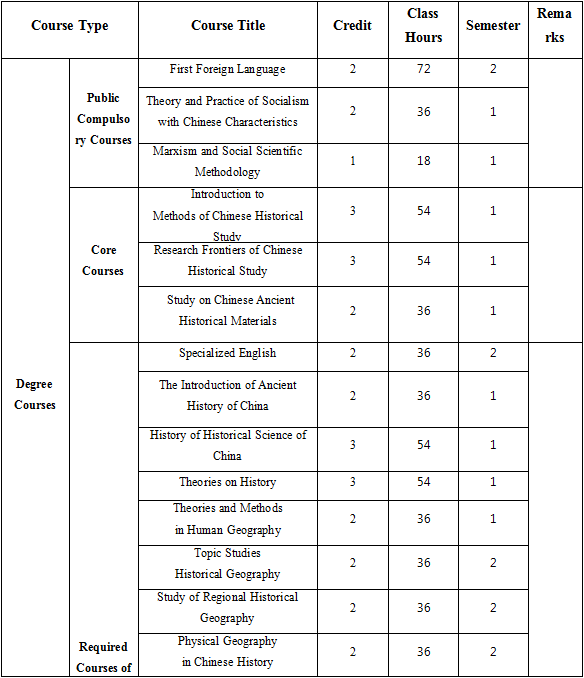
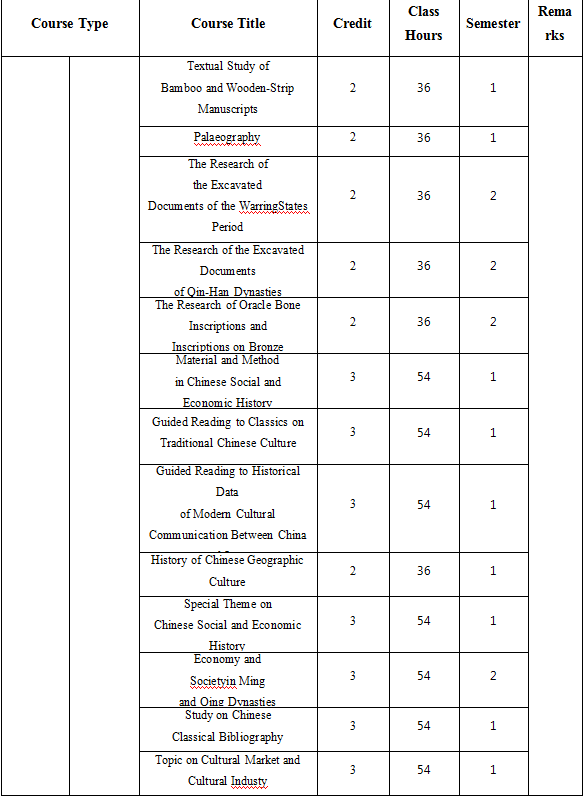
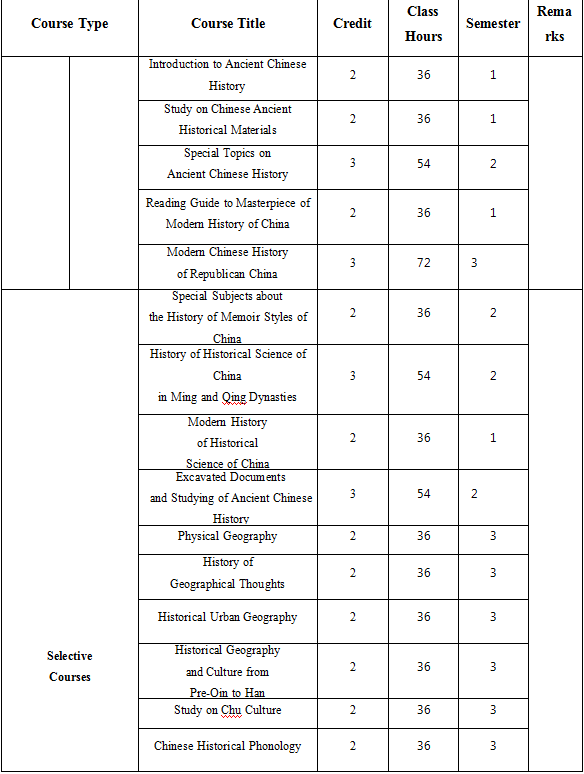
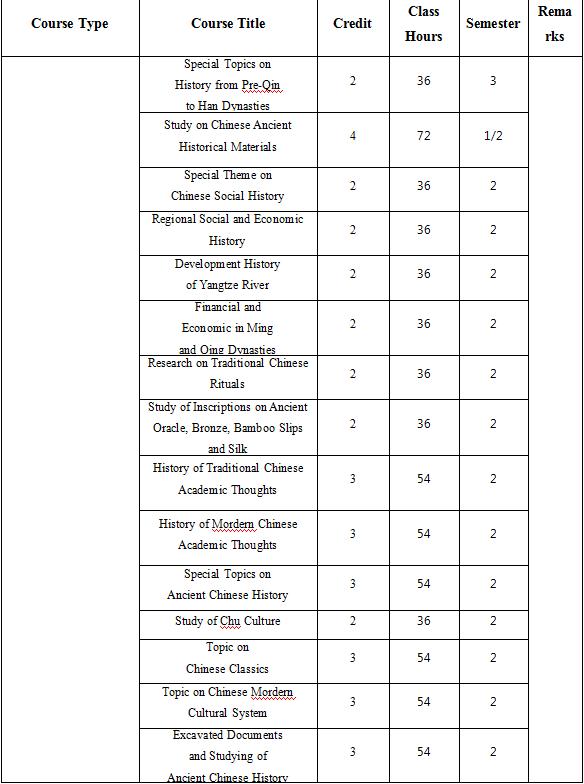
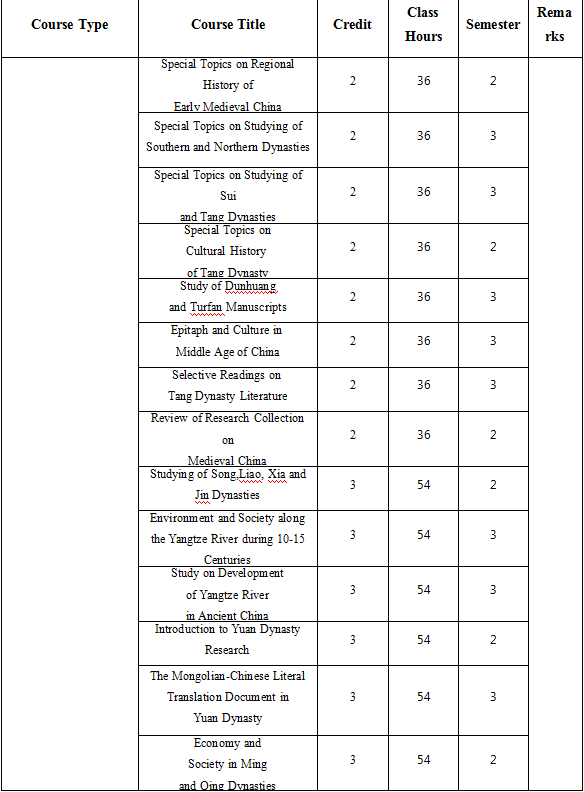
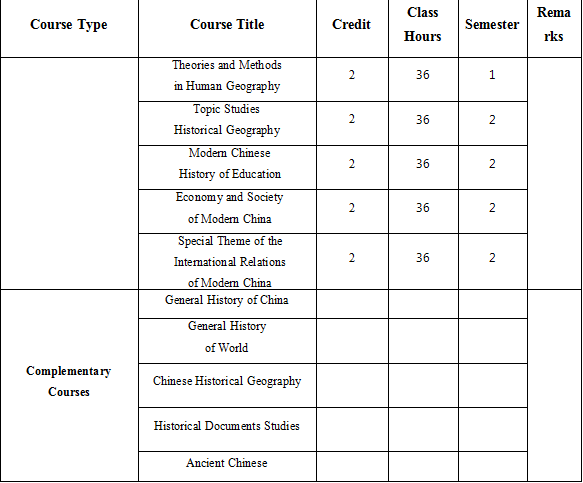
School of history, Wuhan University Add: Hongshan District, Wuhan City, Hubei Province